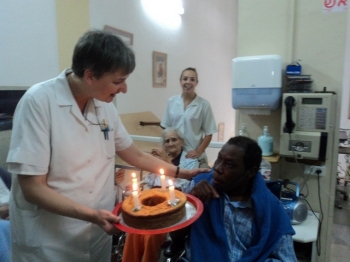Sister Monika from Jerusalem, witness of unity close to the sick

Thanks to the support of the Order of the Holy Sepulchre, the Saint-Louis Hospital in Jerusalem was able to meet regulations and avoid closure; new double bedrooms, each with a restroom, and a new large ‘Kosher’ kitchen. The director of this establishment gives testimony of her activity in persevering in the service of interreligious dialogue near to the suffering, and of her spiritual commitment in following Christ.
Originally from Germany, Sister Monika Duellmann, a Religious in her fifties from the congregation of the Sisters of Saint Joseph of the Apparition founded by St Emilie of Vialar in south-west France in 1832, manages the French Saint-Louis Hospital in Jerusalem. It is by first being a volunteer close to the sick in this geriatric establishment of palliative care, that she came to know the religious family, before then committing herself for life, all the while practising her nursing profession.
The Sisters of Saint Joseph came to Jerusalem in 1848 at the invitation of the first Patriarch, Mgr Joseph Valerga, just named by Pope Pius IX to rebuild the Latin Patriarchate of Jerusalem. A few years later, the French baron, Paul-Amedee de Peillat, bought a site of land and had the hospital constructed, replacing an old leprosarium of the Middle Ages and so enabling the sisters to work there. He had come on pilgrimage and confronted with the health problems of his pilgrimage group who were sleeping in tents, the baron desired that a health establishment be built.
Today, ten sisters, aided by twenty volunteers and local staff envelop fifty sick; Christian, Muslim and Jewish alike, in an interreligious atmosphere of indescribable peace and joy. The activities there help in building a special atmosphere, like for example art lessons which the sick, including those who are in wheelchairs or on oxygen, can attend. “Health unites everyone”, summarises Sister Monika, integrated in a world that is notably Jewish. She speaks Hebrew and gives Christian Religious Education lessons in a nursing school run by the Orthodox Jews.
In Saint-Louis Hospital many Rabbis take office in service of the sick. “Love reigns here, more than the rules, and we experience a concrete interreligious dialogue, to the point of Christians and Jews in particular praying together, motivated in easing together the suffering of those entrusted to us”. Sister Monika also speaks Arabic, and testifies to the good relationships which are forged in the hospital between the Arabic staff members and the guests of Jewish faith who form 70% of the sick welcomed.
Historically the building, close to the old city, is situated on what was the borderline between Israel and Jordan, and in 1956 a ceasefire was called to allow them to look for the dentures of one of the community’s Religious. Sister Monika willingly evokes this symbolic episode in order to help us understand the vocation of the hospital, as a bridge of brotherhood.
Saint-Louis Hospital was before all else a general hospital, which then specialised in cancer treatments, and is now transformed into an establishment for palliative care to accompany people at the end of their lives. “During this extreme situation for the human being, about to pass to the next world, unity is realised in respecting the beliefs of each person”, underlines Sister Monika with a big smile.
She draws her strength from the communion of saints. “I have an army praying for me in Heaven, formed by all those whom we have prepared to live well the moment of their death”, she says. Like Saint Mother Teresa of Calcutta, from the viewpoint of eternity, what matters the most to Sister Monika is the happiness of souls.
François Vayne
(September 9, 2016)



